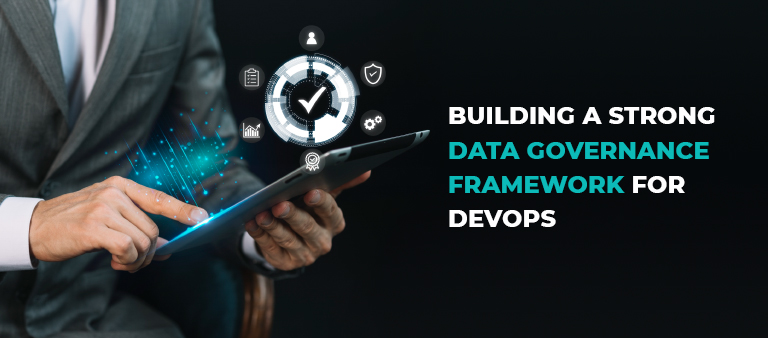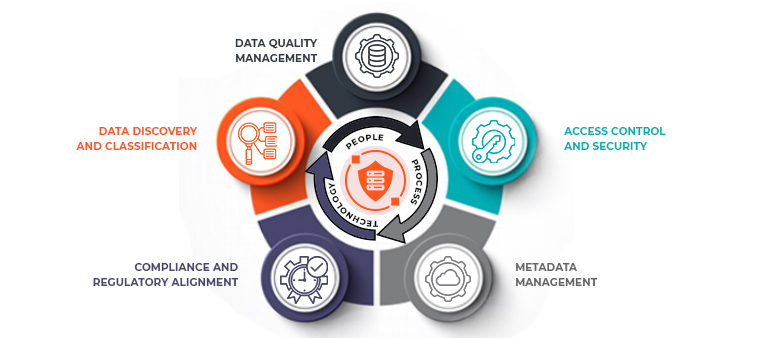
Building Robust Foundations: Data Governance’s Crucial Role in DevOps Evolution.
In the fast-paced world of technology, the integration of Data Governance Frameworks into DevOps practices has become a critical component for organizations aiming to streamline their processes, enhance data quality, and ensure regulatory compliance. DevOps, known for its collaborative and iterative approach to software development and IT operations, can greatly benefit from a well-defined Data Governance strategy. This article explores the significance of Data Governance in DevOps, its key components, and best practices for successful implementation.
Understanding the Role of Data Governance in DevOps
- Introduction to Data Governance:
Data Governance involves the creation and enforcement of policies and practices to ensure high data quality, security, and compliance across an organization. In the context of DevOps, Data Governance becomes essential to manage the increasing volume and complexity of data generated throughout the development lifecycle. - Challenges in DevOps Without Data Governance:
Without a proper Data Governance Framework, DevOps faces challenges such as inconsistent data quality, lack of transparency, and increased risks related to data breaches. Implementing Data Governance in DevOps mitigates these challenges by providing a structured approach to managing and securing data.
Components of a Data Governance Framework in DevOps

- Data Discovery and Classification:
Begin by identifying and classifying data within the DevOps pipeline. This involves understanding the sensitivity and importance of data at each stage. Automated tools can aid in discovering and tagging sensitive data, ensuring proper handling and protection. - Data Quality Management:
Establish metrics and standards for data quality throughout the DevOps lifecycle. Implement automated testing and validation processes to identify and rectify data quality issues early in the development cycle, preventing downstream problems. - Access Control and Security:
Define access controls and encryption standards to safeguard sensitive data. Role-based access ensures that only authorized personnel have access to specific data sets, reducing the risk of unauthorized access and data breaches. - Metadata Management:
Create a centralized repository for metadata to track the lineage, usage, and transformation of data. This aids in maintaining a clear audit trail and enables quick issue resolution by providing insights into data dependencies. - Compliance and Regulatory Alignment:
Ensure that Data Governance practices align with industry regulations and compliance standards. Regular audits and assessments help in verifying adherence to data protection laws, reducing legal risks associated with non-compliance.
Best Practices for Implementing Data Governance in DevOps
- Collaboration Across Teams:
Foster collaboration between data teams, development, and operations. Cross-functional communication ensures that Data Governance practices are integrated seamlessly into the DevOps workflow. - Automated Data Governance Policies:
Implement automated policies for data governance to ensure consistency and efficiency. Automated checks and balances help in identifying and addressing issues in real-time, preventing data-related bottlenecks. - Continuous Monitoring and Feedback:
Establish continuous monitoring processes to track data quality and security metrics. Regular feedback loops enable teams to adapt and improve their Data Governance practices based on evolving requirements and challenges. - Education and Training:
Provide comprehensive training to DevOps teams on the importance of Data Governance. An informed team is more likely to adhere to established policies, reducing the likelihood of unintentional data mishandling. - Scalability and Flexibility:
Design the Data Governance Framework to be scalable and adaptable to the evolving needs of the organization. As DevOps practices and technologies evolve, the Data Governance Framework should be flexible enough to accommodate these changes seamlessly.
Conclusion
In conclusion, integrating a robust Data Governance Framework into DevOps practices is imperative for organizations seeking to harness the full potential of their data while ensuring security, compliance, and data quality. By combining the agility of DevOps with the structure of Data Governance, organizations can create a well-balanced approach that not only accelerates development but also safeguards the integrity and confidentiality of their data assets. As technology continues to advance, the synergy between Data Governance and DevOps will play a pivotal role in shaping the future of data-driven innovation.
